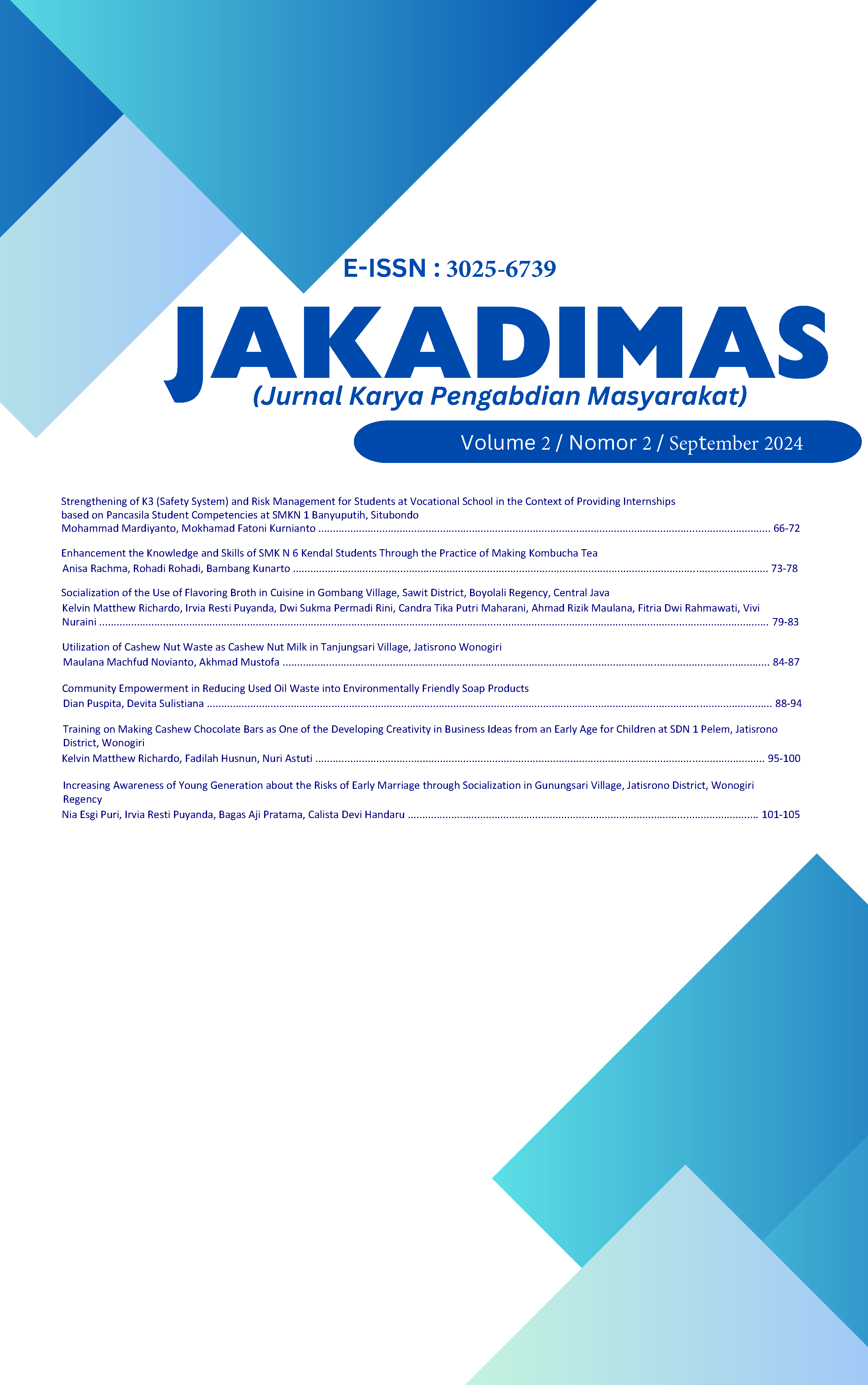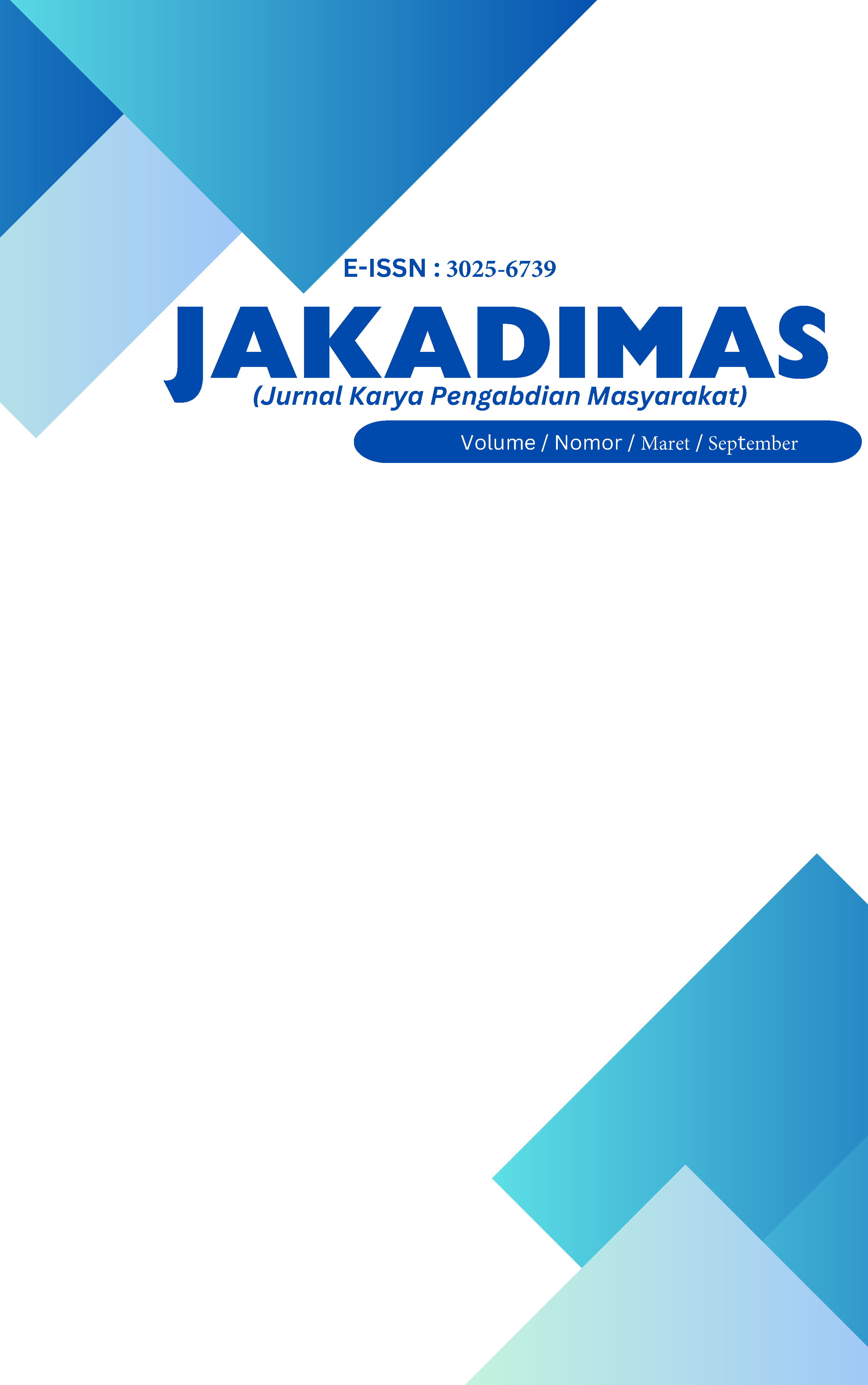Community Empowerment in Reducing Used Oil Waste into Environmentally Friendly Soap Products
Pemberdayaan Masyarakat dalam Mengurangi Limbah Minyak Bekas menjadi Produk Sabun Ramah Lingkungan
DOI:
https://doi.org/10.33061/jakadimas.v2i2.11658Keywords:
Household Waste, Used Cooking Oil, Mentoring, SoapAbstract
The community service program conducted in Sukosewu Hamlet, Sukosewu Village, Gandusari District, Blitar Regency, aims to provide solutions for addressing the issue of used cooking oil waste while simultaneously reducing the environmental pollution caused by its use and promoting product diversification among the local Women’s Empowerment Group (PKK). The training and counseling/socialization methods were carried out for two months to the PKK group. The outreach took place from May to June 2024 in Sukosewu Hamlet, where participants were educated on environmentally friendly methods of processing soap from used cooking oil. Direct mentoring was provided to support the participants, which successfully resulted in the production of eco-friendly soap, contributing to improving the local economy. Additionally, the PKK members gained a deeper understanding of the harmful effects of used cooking oil on health and the environment thanks to this program. Ultimately, participants were also trained in the proper disposal of used cooking oil waste and how to utilize it to prevent environmental pollution. From this mentoring activity, a new product was produced, namely environmentally friendly soap, and public awareness began to grow regarding the importance of protecting the surrounding environment which can increase the economic value (income) of the community, especially mothers in the PKK group.
References
Doni, S. (2018). Formulation of kaolin solid soap with varying coconut oil and stearic acid concentration for cleansing severe najis. Jakarta: Fakultas Ilmu Kesehatan UIN Syarif Hidayatullah.
Irhamsyah, F. (2019). Sustainable development goals (SDGS) dan dampaknya bagi ketahanan nasional. Jurnal Lemhannas RI, 7(2), 45–54.
KEMENDAGRI RI. (2013). Permendagri Tahun 2013 Pasal 1 tentang Pemberdayaan Masyarakat Melalui Gerakan Pemberdayaan dan Kesejahteraan Keluarga (PKK).
Ketaren, S. (1986). Pengantar teknologi minyak dan lemak pangan. UI press, Jakarta.
Priani, S. E., & Lukmayani, Y. (2010). Pembuatan sabun transparan berbahan dasar minyak jelantah serta hasil uji iritasinya pada kelinci. Prosiding SnaPP, Edisi Eksakta. ISSN, 2089–3582.
Rukmini, A. (2007). Komparasi efektivitas adsorben komersial dan non komersial dalam proses regenerasi minyak jelantah. Prosiding Seminar Nasional Teknologi Pangan, 455–459.
Sulistiana, D., Anggraini, D. P., & Malahayati, E. N. (2023). Formulasi Sediaan Sabun Padat dari Limbah Whey Tahu dengan Penambahan Olive oil. Jurnal Promotif Preventif, 6(6), 892–897.
Travis, M. J., Weisbrod, N., & Gross, A. (2008). Accumulation of oil and grease in soils irrigated with greywater and their potential role in soil water repellency. Science of the Total Environment, 394(1), 68–74.
Waluyo, Untung., Ramadhani A. , Suryadinata A., Cundari L., (2020). Review: penjernihan minyak goreng bekas menggunakan berbagai jenis adsorben alami, Jurnal Teknik Kimia, 26(2), 70-79.
Wijana, S., Soemarjo, S., & Harnawi, T. (2009). The Study on Liquid Soap Production from Recycled Frying Oil (The Effect of Mixing Time and Water: Soap Ratio on the Quality). Jurnal Teknologi Pertanian, 10(1).
Downloads
Published
How to Cite
Issue
Section
License
Copyright (c) 2024 Dian Puspita, Devita Sulistiana

This work is licensed under a Creative Commons Attribution-ShareAlike 4.0 International License.
Authors who publish with this journal agree to the following terms:
- Copyright on any article is retained by the author(s).
- The author grants the journal, right of first publication with the work simultaneously licensed under a Creative Commons Attribution License that allows others to share the work with an acknowledgment of the work’s authorship and initial publication in this journal.
- Authors are able to enter into separate, additional contractual arrangements for the non-exclusive distribution of the journal’s published version of the work (e.g., post it to an institutional repository or publish it in a book), with an acknowledgment of its initial publication in this journal.
- Authors are permitted and encouraged to post their work online (e.g., in institutional repositories or on their website) prior to and during the submission process, as it can lead to productive exchanges, as well as earlier and greater citation of published work.
- The article and any associated published material is distributed under the Creative Commons Attribution-ShareAlike 4.0 International License








